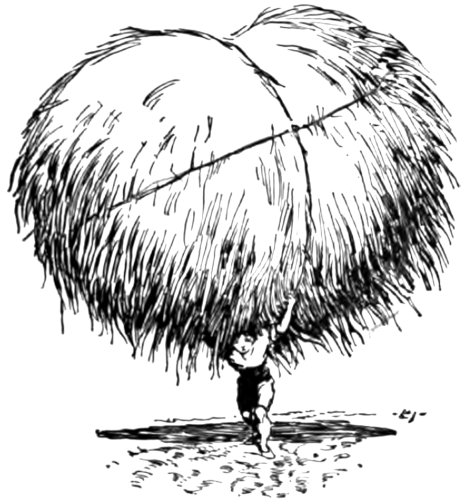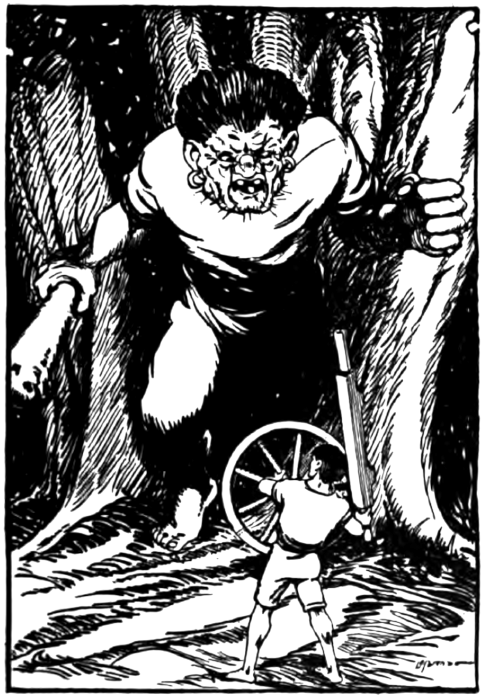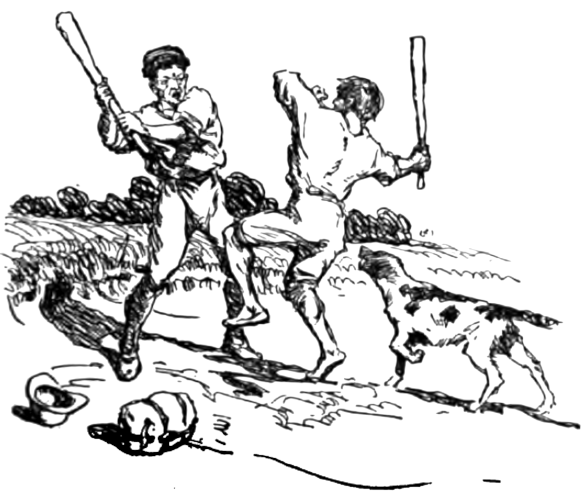| Web
and Book design,
Copyright, Kellscraft Studio 1999-2024 (Return
to Web
Text-ures)
|
Click
Here to return to The Elm Tree Fairy Book Content Page Return to the Previous Chapter |
 (HOME)
|
|
TOM
HICKATHRIFT
ONCE upon a time there was a man named
Thomas Hickathrift.
He was a poor man and a day laborer,
and the only remarkable thing about him was that he was so strong he
could do
two days' work in one. His only child was a son whom he called by his
own name,
and he did his best to give this son a good education, but the lad did
not like
to go to school and got very little good from the teaching. Presently the father died, leaving Tom and
his mother to get
along in the world as best they could. The boy was now ten years old,
and it
was evident he was going to grow into an unusually large man, for he
was
already six feet, three inches tall, and over two feet broad across his
chest,
and his hand was like a shoulder of mutton. He ate as much as would
serve three
or four ordinary men, yet he rarely lifted a finger to help his poor
mother and
spent most of his time sitting in the chimney corner. Mrs. Hickathrift
had to
work early and late to get a living for the two of them. However, she
did the
best she could and never complained. The beds on which she and Tom slept were of
straw, and she,
being very tidy in her habits, every now and then liked to have a new
bed. So
one day she went to the home of a neighboring farmer and begged a
bundle of
fresh straw. "Take what you want and welcome," said the
farmer. "I will send my son to fetch it," she
replied, and
returned to her cottage. It required considerable urging to get Tom
started, but at
last he said he would go if she would borrow a cart rope for him.
Otherwise, he
would not budge a step. His mother was only too glad to gain his help
on any
terms, and she went and got the rope. As soon as she returned with it
he took
it over his arm and walked off. He found the farmer and his two men in
the barn
threshing. "I am come for the straw you promised my mother," said
Tom. "Help yourself," responded the farmer. "You
can have as much as you can carry." So Tom laid his rope down in the right
position and began to
pile the straw on it. "Your rope is too short," said the farmer by
way of a joke. But Tom paid no heed to him and kept on till
he had as much
straw on the rope as would have made a wagon load. Then he tied it up
tightly
while the men looked on laughing at his folly. "You couldn't carry a
tenth
as much," said they.  Tom's strength being thus made known there
was no longer any
basking by the fire for him. Everyone was telling him it was a shame to
lead
such a lazy life, and they wanted to hire him to work. So he gave up
his old
ways and was always busy after this. One day, as Tom was passing through the
forest he found a
party of four men, who had come with a wagon drawn by six horses to get
a great
log. The men were doing their best to roll the log on to the wagon, but
they
could not get it off the ground. "Stand away!" said Tom, and he picked up the
log
and placed it on the wagon with ease. "Well done," said the owner of the team,
"and
now what reward will you take?" "Oh, a stick for my mother's fire," replied
Tom.
"All right," the man responded, "take any stick you
please." So Tom pulled up a tree that was bigger than
the log on the
wagon, laid it on his shoulder and walked home with it faster than the
six
horses drawing the log could follow. As time went on, Tom became very fond of
going to fairs and
pleasure gatherings and joining in the sports and pastimes. At cudgels,
wrestling, or throwing the hammer, not a man could equal him. Once he went so far from home to a football
play that the
people who were present had not heard of his fame. For a while Tom
stood by to
see the sport, but at length the ball came bounding toward him and he
gave it a
kick that sent it over the trees out of sight. The players ran to look for it, but it was
not to be found,
and when they came back they gathered about Tom to punish him for
losing their
football. They all rushed on him in a body, but he flung some to the
right and
some to the left and two or three he tossed over his head so that in a
few
minutes they ceased attacking. None durst venture near him and they
whispered
one to another that he must be possessed by an evil spirit. Late in the evening, as he was on his way
home, he was met
by five lusty rogues who had been busy on the road all that day robbing
travellers. They thought Tom would furnish them one more prize, as he
was
alone, and they felt cocksure of getting his purse. "Stand and deliver!" said they. "What should I 'deliver?" asked Tom. "Your money!" they said. "You don't ask for it very politely," said
Tom.
"Come, come!" they cried. "No more prating. Money we want, and
money we'll have before you stir from this spot." "Is that so?" said Tom. "Then you'll have to
take it." They were very angry and all five pounced on
him together.
But Tom knocked them down, every one, and took away their money, which
was over
two hundred pounds. Then he went on and left them, and on reaching home
he made
his mother laugh heartily with the story of how he had served the
football
players and the five thieves. Yet, once at least, Tom found his match. In
wandering along
a forest path one day he met a tinker who had a stout staff in his hand
and a
great dog at his heels carrying his bag and tools. "Whence come you, and whither are you
going?"
asked Tom. "This is no highway." "What's that to you?" said the tinker. "I'll make you know what it is to me before
you and I
part," said Tom. "Well," replied the tinker, "you have your
staff, and I have mine, and I'm ready for a bout with you, though I'm
on my way
to seek Tom Hickathrift. I've heard great things told of that fellow
and would
fain try a turn with him." "Methinks," said Tom, "he'd prove himself
your master, and if it does you any good to know, why, I may as well
inform you
that I am the Tom Hickathrift for whom you are seeking. Now what have
you to
say to me?" "Why, verily," responded the tinker, "I'm
glad we are so happily met. Let's try a match at once." "I'm in earnest," responded the tinker, "and
beg you to waste no more words." So they gripped their staffs, and at each
other they went
laying on their blows with might and main. The tinker wore a leather
coat, and
every whack of Tom's staff that fell on it could be heard a mile. To
Tom's
surprise, the tinker would not retreat an inch till at last he gave him
a rap
that laid him flat on the earth. "Now, tinker, where are you?" asked Tom. But the tinker immediately leaped up and
struck Tom with
such sudden force that it made him reel. Before he could recover
himself the
tinker landed a blow on the other side that almost cracked Tom's neck
and left
him so dizzy that he threw down his staff and cried, "Enough, friend
tinker. You have proven yourself the better man. Shake hands and come
home with
me." So Tom took him to his house where they
nursed their
bruises, and from that day forth there was no stauncher pair of
comrades than
they two. Some time afterward Tom found regular employment with a
merchant who
had been looking for a good, strong man to drive a cart to and from a
town
twenty miles distant. He carried a load going, but returned with the
cart
empty, and he made the trip every day in the week except Sunday. It was
a
wearisome journey. There was another road not half as long, only a
monstrous giant
had taken possession of it and would allow no passers. Tom often
thought of
that road and finally, without saying a word of his intentions to his
master or
anyone else, he one day took the short road. Presently the giant saw
him and
came hurrying to seize the load on Tom's cart. "Who gave you authority to come this way?"
roared
he. "I'll make you an example for all rogues under the sun. Your body
shall soon be hanging on yonder tree." "We'll see about that," said Tom. "Quit your
bragging and hang me if you are able." The giant then ran off to his cave to fetch
his club, and
Tom began to look about to see what sort of a weapon he could find with
which
to defend himself. He had nothing but his whip, and that would be of
little use
against a giant twelve feet tall and six feet around the waist. So Tom
stopped
his horses, unhitched them and turned the cart upside down. Then he
took off
the two wheels and the axletree. One of the wheels he picked up to use
for his
shield, and the axletree served for a club.  Tom and the Giant Now the giant returned and stared at Tom's
weapons. "Much
good will those things do you!" he shouted, and he swung his club
threateningly. But Tom did not fear, and when the giant
made at him he
received the first blow of the club on his wheel, and though the wheel
cracked
it defended him effectively. Then Tom got in a blow with his axletree,
and the
fight continued for some time. Drops of sweat stood on the giant's
face, and,
as he was fat and clumsy, the contest began to tire him. "Let us stop
long
enough to get a drink of water," said he. "No, no," replied Tom, "you will be giving
me
the slip, if we do that," and, laying on his blows faster and heavier
than
ever, he soon stretched the giant dead on the ground. He was now free to visit the monster's cave,
where he found
such a vast store of gold and silver as made his heart leap with joy.
But he
left it till he had put his cart together and carried the load of goods
to the
town. On his way back he filled the cart with the treasure in the cave
and came
home and told the merchant what had befallen him. On the morrow he and
the
merchant and a great crowd of other people went to have a look at the
dead
giant and his cave, and everyone rejoiced; for the giant had been a
great enemy
to all the country. The news spread far and wide of how Tom
Hickathrift had
killed the giant, and the people celebrated the event with bonfires and
the
ringing of bells, and they all looked up to Tom as a hero. The land
which had
been the giant's was given to Tom, and on it he built a handsome house,
and he
was recognized as the chief man in that part of the country. He was no
longer
familiarly called, "Tom," but was addressed as "Mr.
Hickathrift," and no one failed to treat him with due respect. He kept
many servants, lived generously and laid out a great park and stocked
it with
deer. After a time Tom's mother died, and that
left him so lonely
in the big house that he began to look about for a wife. He soon found
someone
to his mind, and the lady was much pleased to be courted by such a
valiant
gentleman. At length the day for the wedding was appointed, but it
happened
that the lady had another admirer who was determined Tom should never
have her.
The rejected lover hired two big, strong troopers to waylay Tom and
kill him.
This they were to do on a forest road along which Tom would pass in
going to
the house of his bride on the wedding day. The troopers mounted their
horses
and galloped off to the forest and hid in a roadside thicket. When they
saw him
approaching, forth they came and blocked the way. "How now, rascals!" quoth Tom, "what would
you be at? Are you weary of the world that you set on one who is able
to crush
you like cucumbers?" The troopers laughed at him and said they
were not to be
daunted by his high words. "High words!" exclaimed Tom. "Well, if words
won't do, I will try action." With that, he ran in between the two
troopers and caught
them up horses and all, one under each arm. Then he walked off with
them out of
the forest. As he passed through a meadow where many haymakers were at
work the
distressed soldiers cried out, "Stop him! Stop him! He is running away
with two of the king's troopers!" But the haymakers laughed heartily to see
how Tom lugged the
captives along. Tom upbraided the two men for their baseness and
declared he
would feed them to the crows. The troopers became more and more
frightened and
at last confessed the plot in which they had been engaged and begged
Tom to
spare their lives. So he made them promise never again to be concerned
in such
a villainous affair, and let them go. When he arrived at the home of his lady he
gave her a full
account of what had happened, and she was more delighted than ever to
think
that she was to marry a man who was able to defend himself so
marvelously. They
were married that day, and he took his bride to his mansion on the
former
domain of the giant, where time passed happily with them to the end of
their
days. |
